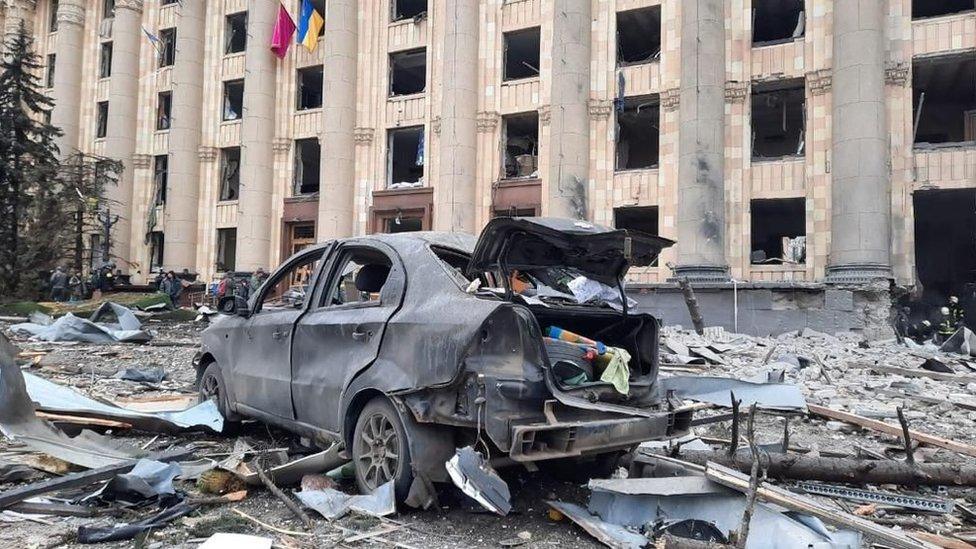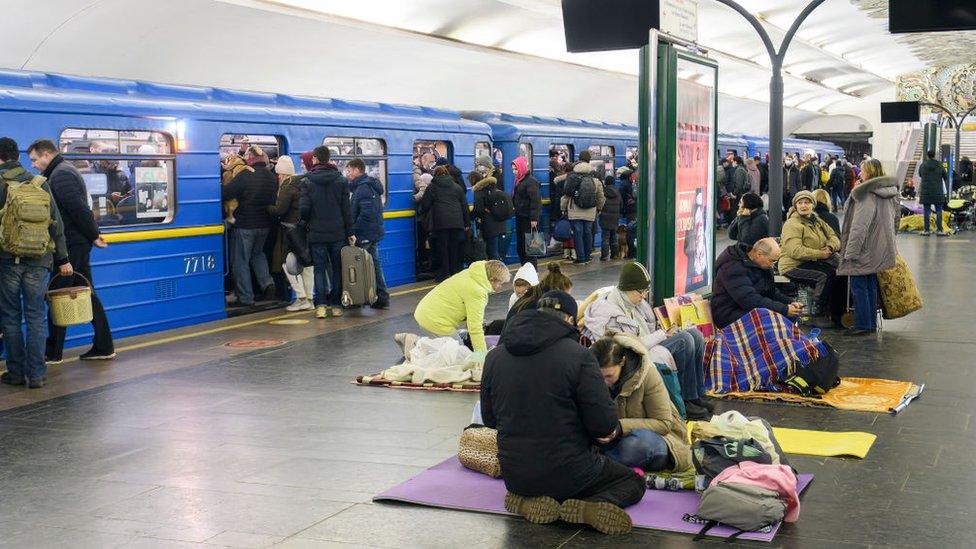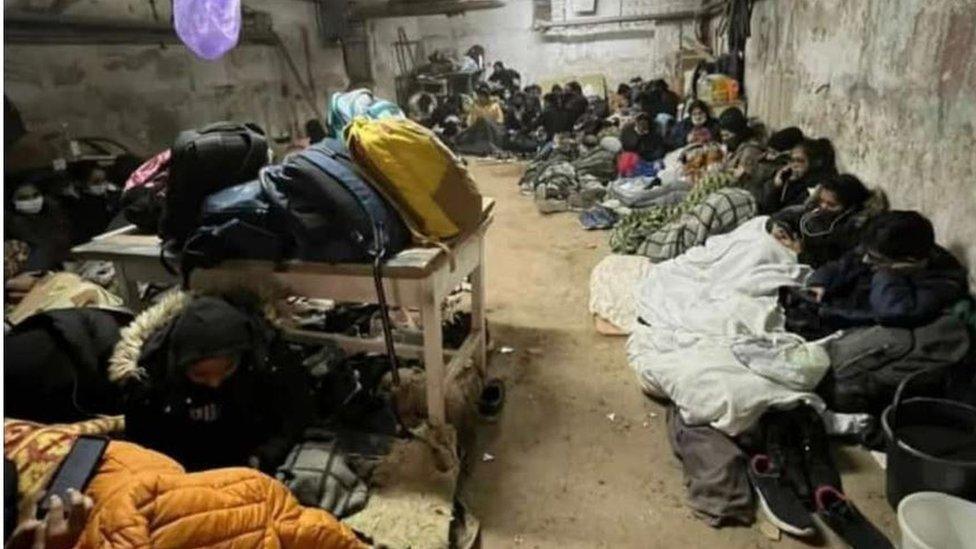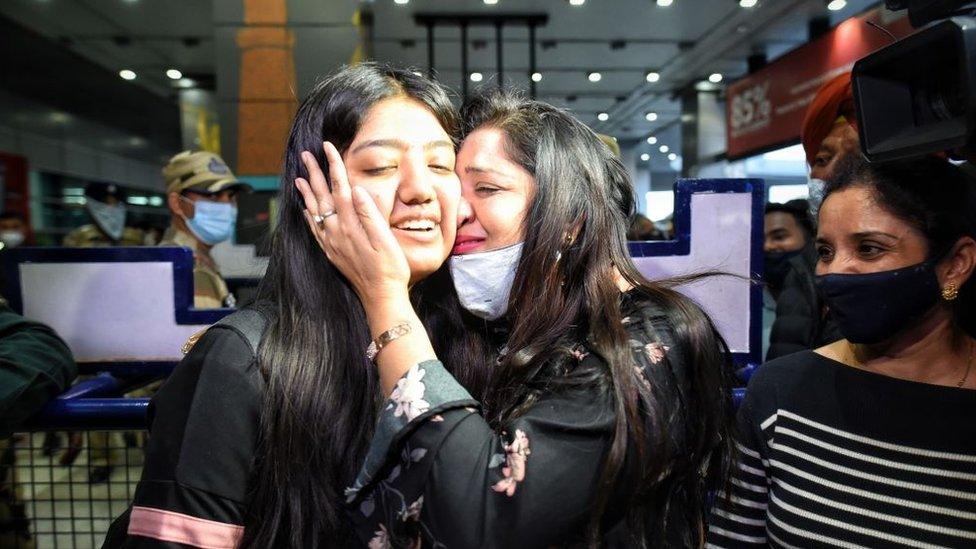Ukraine: Indian students living in fear of shelling in Kharkiv
- Published

An Indian student was killed in Kharkiv during shelling on Tuesday
"We were sleeping when a deafening sound - an explosion - jolted us out of our beds. The whole building shook," says 22-year-old Soumya Thomas, recalling the moment when she fled her college hostel in Kharkiv several days ago.
Russia has been shelling the Ukrainian city since Saturday, shearing branches off trees, blowing out windows and even hitting schools and homes. Soumya's friend and fellow Indian student, Naveen S Gyangoudar, died on Tuesday when he left the bunker in Kharkiv he had been sheltering in to buy food.
On the night of the shelling, Soumya says she and her friends grabbed "whatever they could" and ran to the grocery store, and then the nearest bunker. All of them, including Naveen, were students of the Kharkiv National Medical University.
"It was dingy, dark and so cold - there was no drinking water, so we had to drink pipe water. Outside, explosions rang out from time to time. And when food ran out, we had to manage with just one meal a day."
Soumya says they stayed in the bunker in the hope that the "Indian government would act soon" and rescue them.
WATCH: Indian students take shelter in Kharkiv bunker amid shelling
"But then my friend died. And I thought to myself: no one is coming to save us."
Twelve hours and three missed trains later, Soumya said she was exhausted.
She was speaking to the BBC on Tuesday night, while the group - some 20 of them - waited for a train to Lviv, a city in the western corner of Ukraine, close to the Polish border, where they hope to find help to get home.

Residents in Kiev and Kharkiv have been sheltering from attacks in metro stations
"It's been six days since we have slept or ate properly. There is the sound of explosions piercing our ears... my friend is wheezing and even the pharmacy hasn't opened to give her medicine."
Soumya worries that their meagre supplies - eight boiled eggs, one loaf of bread and two packs of biscuits - may not last them through the 15-hour journey ahead. That is, if she manages to get on a train - her group has been barred from boarding three times because, she alleges, they are not Ukrainians.
Thousands of Indian students are believed to be still stranded in Kharkiv as artillery shells strike the city.
India has ramped up evacuation efforts amid logistical hurdles to get its citizens home. Some 12,000 students have returned so far, India's foreign secretary has said. The country's foreign ministry has been advising Indians to make their way to border areas and cross over to board special flights from Poland, Hungary, Slovakia and Romania. It has dispatched ministers to each of these countries to help with rescue efforts.
On Wednesday, India's government updated its advisory, instructing Indians in Kharkiv to leave immediately, on foot if necessary. They were told to head to districts on the west and south-western outskirts of the city by nightfall.
Allow X content?
This article contains content provided by X. We ask for your permission before anything is loaded, as they may be using cookies and other technologies. You may want to read X’s cookie policy, external and privacy policy, external before accepting. To view this content choose ‘accept and continue’.

Indians account for a quarter, an estimated 20,000, of Ukraine's 76,000 foreign students, the largest cohort, according to official data. Many of them are there to study medicine in the country's state-run universities, which provide affordable quality education.
Many students are also stuck close to or at border crossings as they flee westward to escape advancing Russian troops.
Robin, who only goes by his first name, was also in Kharkiv until Tuesday but managed to board a train to "somewhere west" of the country by afternoon.
He says he managed to grab only his passport before fleeing the hostel - he had hoped to be better prepared, but when the attacks started, he says the shelling was so "furious" that there was "no time even to run".
A third-year student at the medical college, he was sheltering in the same underground metro in Kharkiv as Naveen, the Indian student who died. He says they left around the same time.

Indians students have been sheltering in bunkers in Kharkiv
While Naveen went out to buy food, Robin and his friends tried to find a way to the railway station.
It was cold, he says. People appeared like silhouettes under the glare of headlights as cars frantically drove past him, only to get stuck in front of mounds of debris from shelled buildings.
He described serpentine queues at grocery stores and crumbling buildings, some reduced to a pile of stones, with debris and burnt vehicles strewn along the road.
"I was still searching for a taxi when we heard the deep rumble of an explosion," he says. "Minutes later we found out that Naveen had died."
He said they jumped into the taxi and fled.
On the train, he says, there were no seats as people crammed into the compartment.
"There is no place to even stand and we have already run out of food and water," he told the BBC over messages while he was on the train.
Back home in India, his parents are worried sick about him, he says. They stay in touch on WhatsApp, sporadically exchanging messages so Robin can save his phone battery.
"We are up against seemingly impossible odds but I am still hoping that all of us will be evacuated as soon as possible."
As for his parents, they continue to wait anxiously, he says: "What else can they do?"

Relieved parents have been receiving their children returning from Ukraine
Thousands of miles away, helpless and anxious parents have been glued to their TVs in India, watching warplanes, soldiers with guns and mortar blasts - as they wait with dread and hope for the next frantic message or call from their children.
"This is so bad, we talk to our daughter every day but can do nothing to help her," says Soumya's father, Biju Thomas, in the southern state of Kerala.
He says he tried contacting officials from the Indian government but was told that Soumya should try to get to a border city. So they are hoping that she can get on a train to Lviv.
"The rest we leave to God," Mr Thomas says.
Some parents, like Asif Ansari in the northern state of Uttar Pradesh, had advised their children to come home when tensions between Russia and the West started rising weeks ago.
Mr Ansari says he told his 18-year-old son, Noman, also a student at Kharkiv Medical University, to take the next flight back to India.
But when his son assured him he had nothing to worry about, he relented.
Noman has been stuck in his hostel's bunker for six days with little food and water and "absolutely no way out".
Mr Ansari and his wife are devastated. "I shouldn't have listened to him," he says, his voice cracking. "But who could've thought things would change this much?"
Mr Ansari says he tried several times to contact embassy officials in India. He wonders why the Indian government took longer than other countries to issue an advisory asking people to leave Ukraine.
On 15 February, the Indian embassy in Ukraine said nationals who did not have essential work in the country "may consider leaving temporarily" due to "uncertainties" in the situation. This came four to five days after similar advisories from the UK and US, which told their citizens to leave immediately.
"I just want to see my son again," Mr Ansari says.
"Every time I talk to my Noman, he pleads for help. I tell him to hold on tight, that help is coming. But when will it come?"

You might also be interested in:
A resident in Donetsk asks "How much longer until this is over?" as buildings in the city are destroyed
